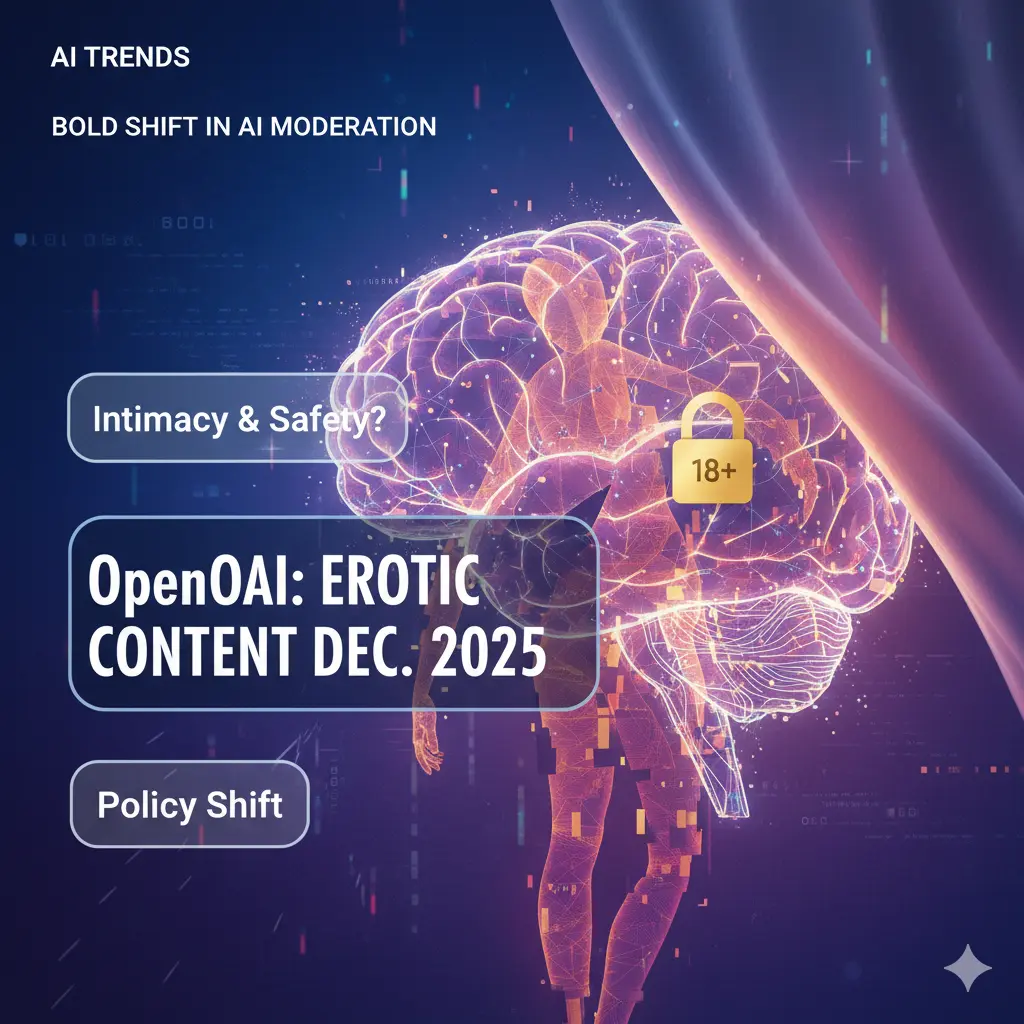ChatGPT loosens restrictions with a bold new policy, sparking debate over AI intimacy, safety, and content moderation
By AI Trend Scout | October 17, 2025
Pull Quote: “We’ve restricted too much because of edge cases and assumed all users are in crisis.” — Sam Altman, CEO, OpenAI
In a sweeping policy shift, OpenAI has announced that its flagship chatbot, ChatGPT, will soon be able to engage in erotic and sexually explicit conversations, but only for verified adult users. Starting in December 2025, the platform will allow mature content generation for those who confirm they are over 18, marking a pivotal evolution in how AI companies address intimacy, free expression, and digital safety.
The move has ignited conversation across the tech industry, raising critical questions about ethics, mental health, age verification, and the very role of AI in human relationships.
“Treat Adults Like Adults”
Sam Altman, OpenAI’s CEO, framed the policy change under the principle of treating adults like adults. “We’ve restricted too much because of edge cases and assumed all users are in crisis,” Altman told Axios. OpenAI now believes that the vast majority of users can engage responsibly with more expressive and intimate interactions as long as safeguards are in place.
To that end, the company is rolling out a stricter age-gating system. Only users who verify their age will be granted access to the new adult mode. OpenAI has been developing technology to estimate users’ ages and route experiences accordingly, building on research into age prediction systems published in September.
Sidebar: How Age Verification Might Work
- AI-powered age estimation models
- Government ID verification
- Behavioral analysis
- Manual review (for flagged accounts)
What’s Coming in December
Alongside erotic content capabilities, OpenAI is introducing greater customization. Users will be able to tailor the chatbot’s tone, persona, and style from emoji-laced banter to more emotionally expressive or flirtatious tones. This could transform how users relate to AI, making conversations more personal and potentially more addictive.
Why Now? The Drivers Behind the Shift
OpenAI’s decision appears driven by a combination of user demand, business opportunity, and competitive pressure. Companion AI apps many of which allow romantic or sexual role play have collectively earned over $80 million in 2025 alone. OpenAI likely sees this as an untapped market, especially as rivals experiment with looser content filters.
The company also claims its safety infrastructure has matured. With better moderation tools, refusal protocols, and real-time behavioral monitoring, OpenAI argues it can now manage mature interactions without compromising user safety.
Criticism and Concern
Despite technical advancements, the announcement has sparked intense scrutiny.
Child safety experts warn that age verification is far from foolproof. Minors may still find workarounds through fake IDs or shared accounts. Critics like investor Mark Cuban caution that this policy could “backfire hard” if the safeguards fail.
Mental health professionals also raise concerns. Earlier restrictions were designed in part to prevent users in crisis from receiving inappropriate responses. OpenAI has already faced lawsuits related to its responses to vulnerable users, and some fear this change reopens those risks.
Pull Quote: “OpenAI’s erotic mode may become a Pandora’s box if safeguards aren’t airtight.” — Tech Policy Analyst
Anti-porn advocacy groups like the National Center on Sexual Exploitation argue the policy “puts vulnerable users at risk” and weakens cultural boundaries around AI and consent.
U.S. Senator JD Vance called the decision a dive into “weird porn,” joining a chorus of political and moral critics who fear that AI-generated erotica may normalize unhealthy behaviors or bypass human boundaries altogether.
What This Means for the Future of AI
OpenAI’s policy change is likely to ripple across the AI industry. If successful, it could encourage other companies to relax their content rules, setting a new baseline for what AI can say and do in adult contexts.
The move could also usher in new monetization strategies. A premium tier for adult features might emerge, turning AI intimacy into a revenue stream. That, in turn, could reshape user expectations, pushing developers to further humanize AI interactions.
It also raises deeper philosophical questions: Should AI play a role in sexual or romantic life? Can an algorithm consent? What happens when users fall in love with a machine that can now talk dirty back?
The Bottom Line
OpenAI’s decision to permit erotic content for verified adults is more than a policy update. It’s a signal of where the boundaries of AI-human interaction are heading. By leaning into intimacy, the company is exploring both the promise and peril of emotionally resonant machines.
Whether this gamble pays off will depend on how well OpenAI can enforce its safeguards, respond to inevitable misuse, and navigate a cultural landscape still grappling with the ethics of AI intimacy.
Sidebar: Key Dates
- September 2025: Age prediction model research published
- October 2025: Policy change announced
- December 2025: Erotic mode launches for verified adults
One thing is certain: ChatGPT is about to get a lot more personal.

